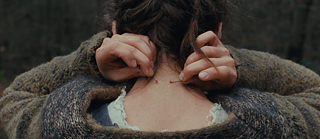Movie review | Berlinale Bloggers
"The Devil's Bath": folk horror at its best

"The Devil's Bath", the latest film from Veronika Franz and Severin Fiala, the directors behind the highly disturbing "Goodnight Mommy" ("Ich seh Ich seh"), the original from 2014 and not the lukewarm remake from 2022, once again proves their talent as horror directors.
By Samuel Trépanier
For their latest feature, the two directors have created a perfect duality between horror and historical fact to draw the viewer even deeper into a dark and sad tale of psychological decadence.
A grotesque story
The story tells of events that are little known to the general public, even though many victims have been recorded throughout history, particularly in Austria, the film's main setting, but also in France and several other European nations around the 18th century. As religion exerted its grip on the societies of the time, unhappy women who decided to commit suicide found themselves faced with an unbearable moral dilemma: to take their own lives and go to hell, or to kill a child and then surrender themselves to the religious authorities in order to obtain forgiveness, and therefore eternal salvation, before being executed. We follow Agnès, a flamboyant young woman who has just married and aspires to motherhood. But because this forced marriage places her face to face with a man who prefers other men, her desire for a family will not be fulfilled, which goes against the expectations of those around her, particularly her cold mother-in-law, and she will sink into a dark melancholy, whose folkloric title of the time is the same as the film, "the Devil's Bath".But from which emanates the sublime
The directors plunge us into this waking nightmare by working with impressive chiaroscuro that is fuelled by rooms with very little lighting, often just torches, allowing us to immerse ourselves completely in Agnès's daily distress. Marked by exceptional shot compositions, the film creates a exalted nature that encourages the viewer to recognise a certain beauty, even the sublime, in this tragic story. Despite its splendour, nature oppresses the characters, trapping them in its lair. Mixing sequences that seem to come straight out of a dream with those of a haunting, we admire Anja Plaschg's remarkable performance with an icy gaze. She captivates us throughout, moving us greatly at the film's terrible conclusion. It's worth noting that the excellent actress is also responsible for the film's haunting soundtrack, which she composes under her own musical name, Soap&Skin.Straddling the border between the mystical and the real, the film plays on its subversive nature, combining historical film and horror film, joining the wave of the folk horror revival and drawing on elements from films such as Häxan (1922), The Witchfinder General (1968) and The Witch (2015). For all these reasons, we feel the film deserves the Golden Bear at the 74th Berlinale.